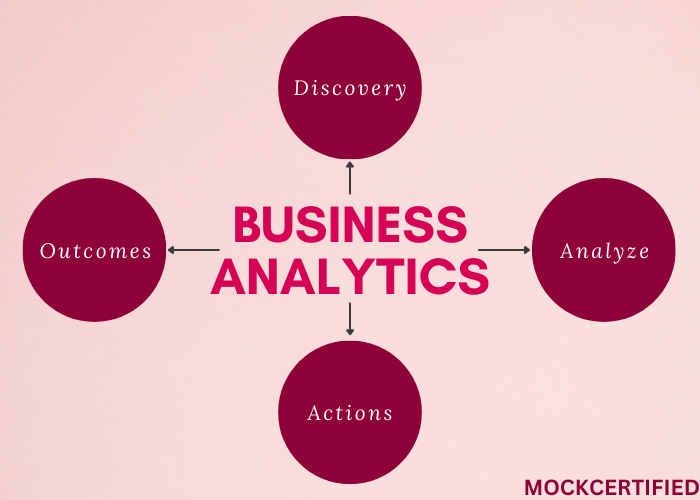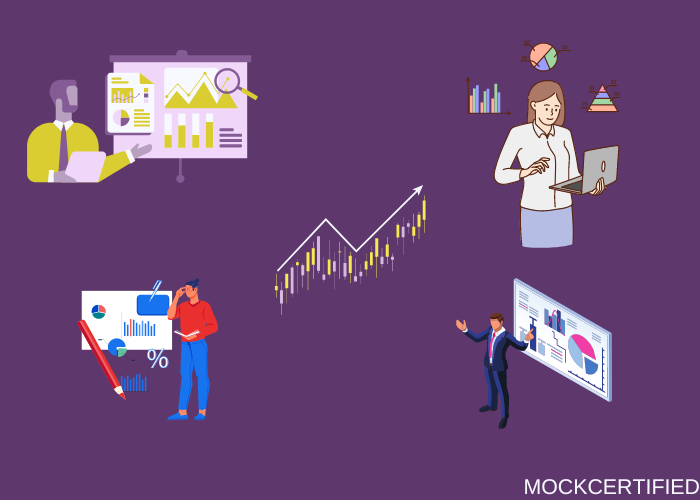Blog
Business Analytics Careers- Are you ready to gain the most of new global career title?
Deepak Sharma
May 22, 2023
5 min read

Table of Contents
Business Analytics Career
The demand for business analytics professionals is increasing in today’s data-driven world. Businesses across all sectors are starting to recognize the benefits of data-driven decision-making, which is raising the need for individuals with the knowledge and abilities to comprehend and interpret complex business data.
Those who are interested in the nexus of business and data can pursue an intriguing career in business analytics.
This article will examine the numerous facets of a business analytics career, including the necessary abilities, job functions, market potential, and upcoming developments.

Introduction
In order to gain useful insights and make wise business decisions, business analytics uses statistical models and data analysis tools.
It integrates business intelligence, statistics, and data science to produce practical advice that boosts productivity and growth in businesses.
A business analytics specialist’s job is to draw important conclusions from huge datasets, spot patterns and trends, and inform important stakeholders of the results.
What is Business Analytics?
Business analytics is the umbrella term for a variety of strategies and techniques used to analyze data and get insightful information.
Data must be gathered, arranged, and interpreted in order to assist decision-making processes.
There are two types of business analytics:
It is both descriptive and prescriptive.
Prescriptive analytics makes recommendations based on insights gained from data analysis, predictive analytics makes predictions based on historical data, and descriptive analytics concentrates on understanding past and present trends.
Why Choose a Career in Business Analytics Career?
- Lucrative Job Opportunities: The demand for business analytics professionals is high, and companies are willing to offer competitive salaries to attract top talent.
- Growing Industry: The field of business analytics is anticipated to see tremendous development as data-driven decision-making becomes more widely used.
- Diverse Applications: Business analytics skills can be applied across various industries, including finance, healthcare, e-commerce, marketing, and more.
- Impactful Role: Business analysts play a crucial role in shaping strategic decisions and driving business success through data-driven insights.
Skills Required for a Business Analytics Career
To excel in a business analytics career, certain skills are essential. These include:
Analytical Skills: The ability to analyze and interpret complex data sets is fundamental to business analytics. Strong analytical skills help in identifying patterns, trends, and correlations in data.
Statistical Knowledge: A solid foundation in statistics enables professionals to apply statistical models and techniques for data analysis and inference.
Data Visualization: Effective data visualization skills help in presenting complex information in a visually appealing and understandable manner.
Programming Skills: Proficiency in programming languages like Python, R, and SQL is crucial for data manipulation, analysis, and automation.
Business Acumen: Understanding business processes, industry dynamics, and key performance indicators is essential for providing relevant insights and recommendations.
Education and Training for Business Analytics Career
There are several educational paths to pursue a career in business analytics.
These include:

Undergraduate degree: A bachelor’s degree in business administration, statistics, mathematics, computer science, or data science is the finest preparation for a career in business analytics.
Master’s Degree: Specializing in business analytics, data science, or a similar topic can improve career opportunities and provide specialized knowledge.
Certifications: Industry-recognized certifications like Certified Analytics Professional (CAP) or IBM Data Science Professional Certificate can add credibility to your skillset.
Job Roles and Responsibilities in Business Analytics Careers
Business analytics offers a range of job roles with varying responsibilities.
Several typical job titles in the industry include:
- Data analyst: To find trends and patterns that guide corporate decisions, data analysts gather, purge, and analyze data.
- Business intelligence analyst: Business intelligence analysts provide reports and dashboards that support strategic decision-making using data visualisation techniques.
- Data Scientist: Data scientists employ advanced statistical modeling techniques to develop predictive and prescriptive models for business optimization.
- Business Analyst: Business analysts bridge the gap between business objectives and data insights, helping organizations make data-driven decisions.

Industries and Sectors for Business Analytics Professionals
Business analytics professionals are in demand across various industries, including:
- Finance and Banking: Business analytics helps in risk assessment, fraud detection, customer segmentation, and portfolio management.
- Healthcare: Data analysis plays a crucial role in patient care optimization, resource allocation, and predictive analytics for disease prevention.
- E-commerce and Retail: Business analytics enables personalized marketing, inventory management, demand forecasting, and customer behavior analysis.
- Marketing and Advertising: Data-driven insights aid in campaign optimization, customer segmentation, market research, and performance tracking.
Job Outlook and Salary Potential in Business Analytics
The job outlook for business analytics professionals is promising. Industry projections predict that in the upcoming years, demand for these professionals would increase dramatically. The salary potential is also attractive, with competitive compensation packages offered to experienced individuals. Factors such as industry, job role, experience, and geographical location influence the salary range.
Advancements and Future Trends in Business Analytics
The field of business analytics is continually evolving especially with ChatGPT. Some key advancements and future trends include:
- Machine Learning and Artificial Intelligence: The integration of machine learning and AI technologies allows for more sophisticated data analysis and automation of processes.
- Big Data Analytics: With the exponential growth of data, professionals need to harness big data technologies to extract meaningful insights.
- Predictive and Prescriptive Analytics: The focus is moving away from descriptive analytics and towards predictive and prescriptive analytics in order to create recommendations that can be implemented.
- Ethical Data Use and Privacy: As data privacy concerns rise, businesses are emphasizing ethical data collection, storage, and usage practices.
Challenges in the Business Analytics Field
While the business analytics field offers numerous opportunities, there are challenges to consider:
- Data Quality and Accessibility: Ensuring data accuracy and availability can be a significant challenge, especially when dealing with large and diverse datasets.
- Interpreting Ambiguous Results: Analyzing complex data can sometimes lead to ambiguous or inconclusive results, requiring careful interpretation and domain knowledge.
- Organizational Resistance to Change: Implementing data-driven decision-making may face resistance from traditional stakeholders who are not accustomed to relying on data.
- Continuous Learning and Adaptation: Keeping up with technological advancements and evolving methodologies requires a commitment to lifelong learning.
Tips for Starting a Career in Business Analytics
Here are some tips to kickstart your business analytics career:
- Develop Technical Skills: Acquire proficiency in programming languages, statistical tools, and data visualization techniques.
- Gain Practical Experience: Apply your skills to real-world projects through internships, freelance work, or personal projects.
- Network and Learn from Peers: Join industry forums, attend conferences, and connect with professionals to expand your knowledge and opportunities.
- Continual Learning: For the same, keep brushing up your knowledge on skills by taking up mock tests.
Business analytics is certainly a high paying and lucrative career if you want to pursue. For more career related blogs visit us here
Share this post
Popular
Get the most out of the hot topics with our favorite blogs!